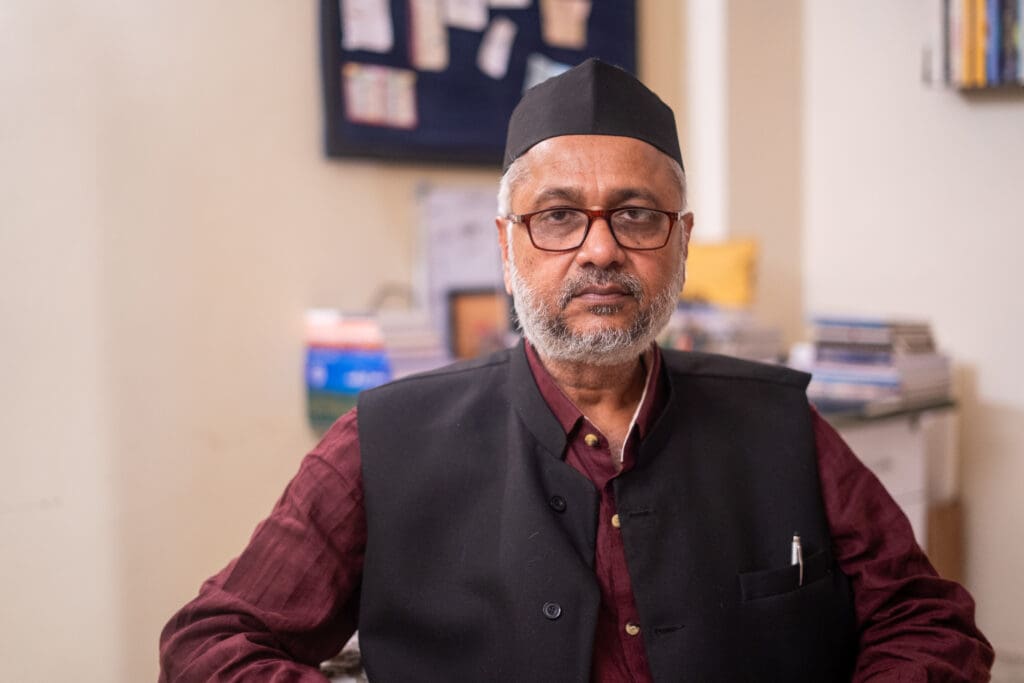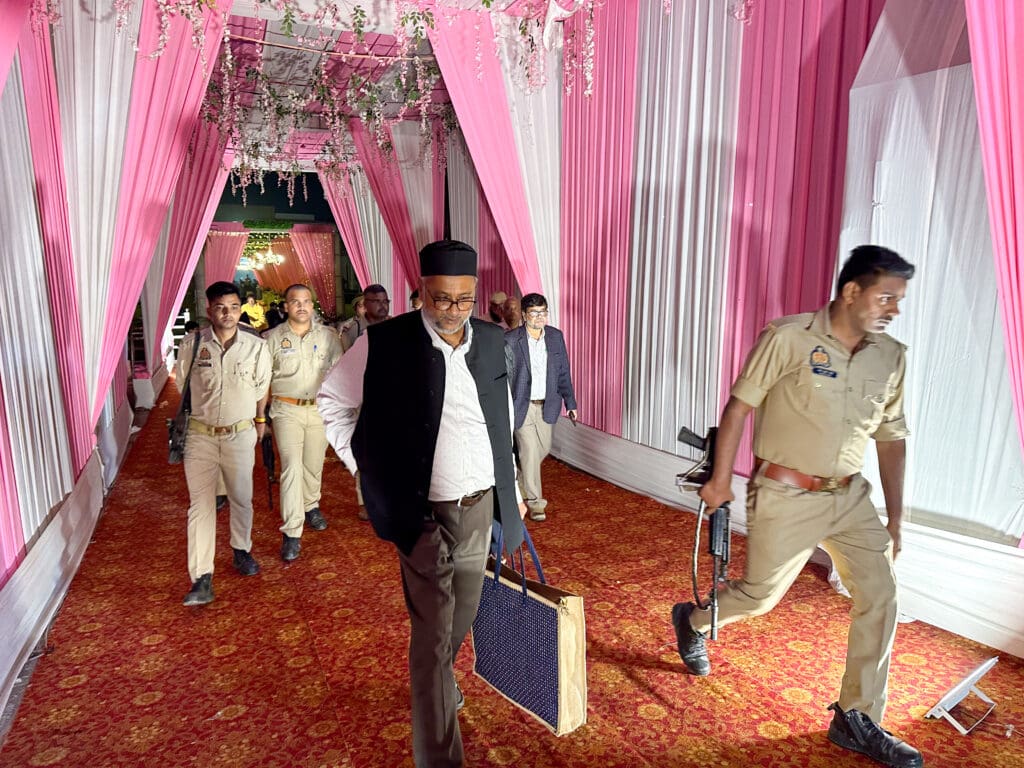
When Javed Mohammed left for the police station on his scooter on the night of 10 June 2022, he never imagined that it would be the last time he would see his home. Neither did he know that he would spend the next 21 months in jail.
“They wanted to make me the conspirator, mastermind. But if I am in custody, why would they illegally detain my wife and daughter? Why did they hurry to raze down the house?” asks Mohammed who walked out of jail on March 16.
According to the United States Commission on International Religious Freedom, Mohammed was detained for “his religious identity, criticizing religious freedom conditions, and community leadership role in protesting religious freedom conditions”.
The Muslim activist was jailed for his alleged involvement in the clashes when police lathi-charged a group of Muslims who attempted to give a memorandum to the district administration of Prayagraj, formerly Allahabad. They were seeking legal action against BJP leaders for making derogatory remarks against Prophet Mohammed.
Protests had erupted nationwide against the remarks by the then BJP national spokesperson Nupur Sharma and another BJP leader Naveen Jindal. The remarks set off diplomatic protests and outrage from the Muslim world and countries including the United States.
The Hindutva figures never got arrested while dozens of Muslims were jailed for protests that killed at least two teenagers.
In Prayagraj, even according to the police, the incident of stone pelting lasted only a few minutes. But later that evening, police detained dozens of Muslim youth, including minors.
During that day, Mohammed, a well-respected community leader, had several conversations with the police and administration over the “Bharat Bandh” called by “unknown people”.
Additionally, Mohammed had appealed to the people to call off the Bandh in a Facebook post.
Mohammed claims his phone records can prove his innocence. But the device seized by police never got listed as evidence in any of his cases.
The 58-year-old was initially slapped with five cases but three more got added as he began getting bail. Along with the eight cases, he got booked under the National Security Act (NSA) which allows the government to detain people without trial for up to a year and the UP-Gangster Act — to stop organized crime.
“I knew none of the people in my gang,” the 56-year-old laughed. Although the other accused got bail within the first few months, Mohammed languished in jail without trial for several more months.
Speaking to Maktoob, Mohammed said he was humiliated by a senior police officer during interrogation who spat on his face and put his boots on his neck. He claims custodial torture endured by others who got detained.
“How could a learned IPS officer do that to another person?” he asks.
House demolished, family suffered


Mohammed wasn’t aware that his wife and daughter were “illegally detained” by police on the night he was arrested. He found out later. They were released after getting assurance that they wouldn’t go home or stop the demolition of their house the next day.
“I had only heard rumours about demolition order in jail. I never thought they would do it. The property was not even in my name. But there was no time to produce the papers as they had already planned to raze down our house,” Mohammed said.
The family had little time to evacuate, leaving their belongings to be razed down by bulldozers. The demolition under heavy police presence was live-telecasted by national and regional news channels.
“The reporters looked through the rubbles with their cameras. Our privacy was violated,” Mohammed’s daughter Afreen Fatima had told Maktoob after the demolition. The episode triggered global outrage.
Local administration tried to cover up the arbitrary demolition by issuing a notice to Mohammed. But the house was owned by his wife. The family has filed a case against the demolition. It has remained an unlisted matter in Allahabad High Court after an initial hearing.
Police also targeted Mohammed’s daughter Afreen Fatima, a well-known student leader who was then a student union councillor at Jawaharlal Nehru University in New Delhi. Allegations by Prayagraj Police forced Fatima to leave the city while the family were rendered homeless.
Within days of arrest, Mohammed was shifted to Deoria jail, about 250 kilometres from his hometown. Police had no explanation for it, he said.
“Jails are changed if the prisoner is a troublemaker. I was an ordinary man and just stayed for a week. They wanted to make it difficult for my lawyers and family to visit me.”
The family now stays in a rented house in Prayagraj. The hope of getting justice over the demolition has shrunk. Mohammed said his business had finished off due to the arrest. Fatima said that the police were hell-bent on not allowing her father to get bail. Police allegedly threatened sureties and lingered on the proceedings even after getting bail.
Mohammed said they had taken an uphill battle to finish the hearing in the NSA case within eight months. But the judge reserved the order. Even after the NSA’s validity expired, the verdict remains reserved.
“What is justice if it’s of no use? ” Mohammed asks while narrating the ordeal.
While in jail, Mohammed’s father, mother-in-law and sister passed away. He laments that he couldn’t attend the funeral and bury them. He alleges that such apathy is only for a specific community.
Meanwhile, the abrupt arrest disturbed the plans for Fatima’s marriage. As legal matters lingered on, the dates had to be postponed until it took a toll on both families.
“I never thought I would make it. There was only Gangster Act left but I had little hope. Thanks to the judge who gave a week interim bail to attend the wedding,” the father of five said.
In February, Mohamed got bail in his last case, the Gangster Act. According to the bail order, “General allegations without material particulars and evidence against the applicant could not by itself a ground to deny bail 10 the applicant given Article 21 of the Constitution of India.”
Social worker in jail
Mohammed said he tried to make his time in jail productive. He began to educate other prisoners on social and religious matters. He helped some with legal aid.
The food was awful there, he said. People with money can get good food, otherwise, it’s miserable, he stated advocating for reforms.
“I think jailed people should also be given a chance to vote. They need rights,” he proposed. Mohammed didn’t return to Prayagraj partially due to a warning from lawyers. Several political prisoners have had the experience of being implicated in other cases as soon as they come out.
But he said people from the locality have been asking him to return. He was running a library for poor students with the money from his business and had an OPD clinic set up.
The family also asserts that he was innocent and framed to show an example for the Muslim community. Javed Mohammed was one of the founding leaders of the Welfare Party of India and served as a leader of Jamaat-e-Islami Hind. During the arrest, he was the president of the Muslim graveyard maintenance committee and had engaged in several legal battles as part of his activism.
“Gradually we will rebuild. I believe this phase will be over. I know things that are taken away will never come back. But slowly we will get back on our feet,” he added.



